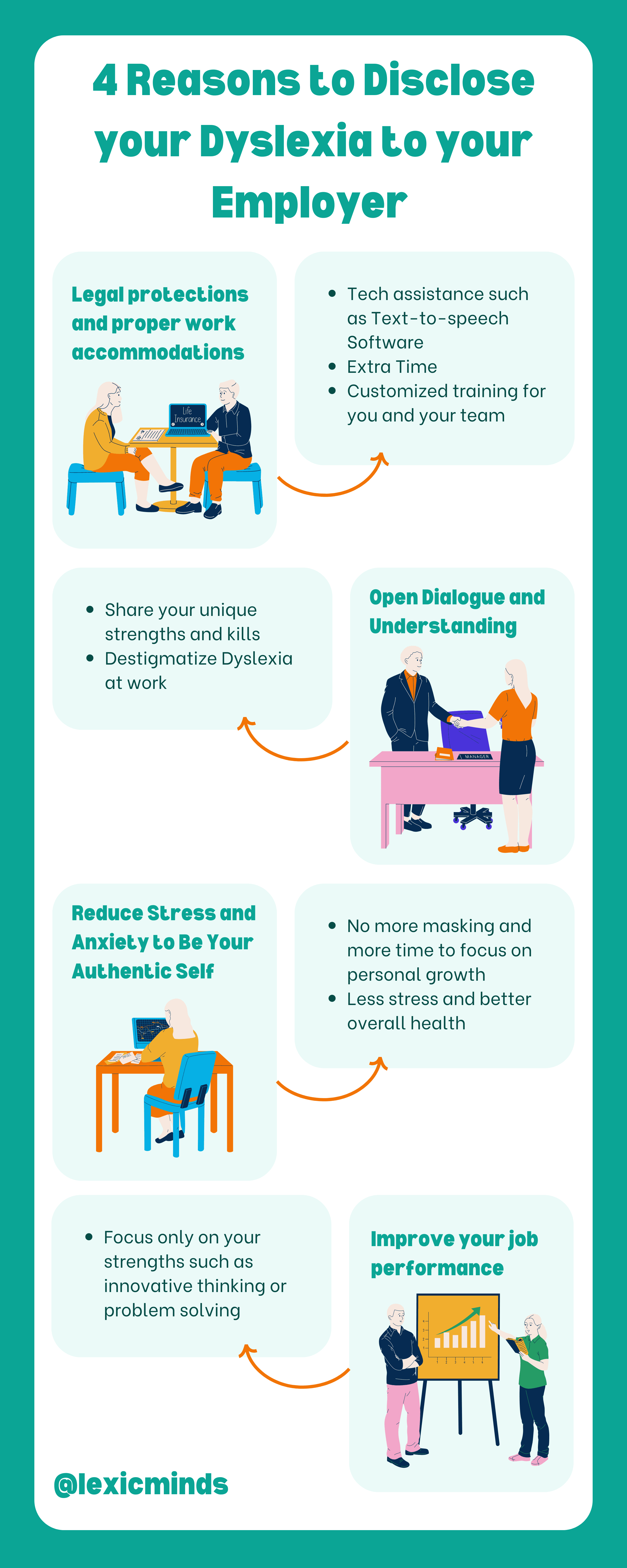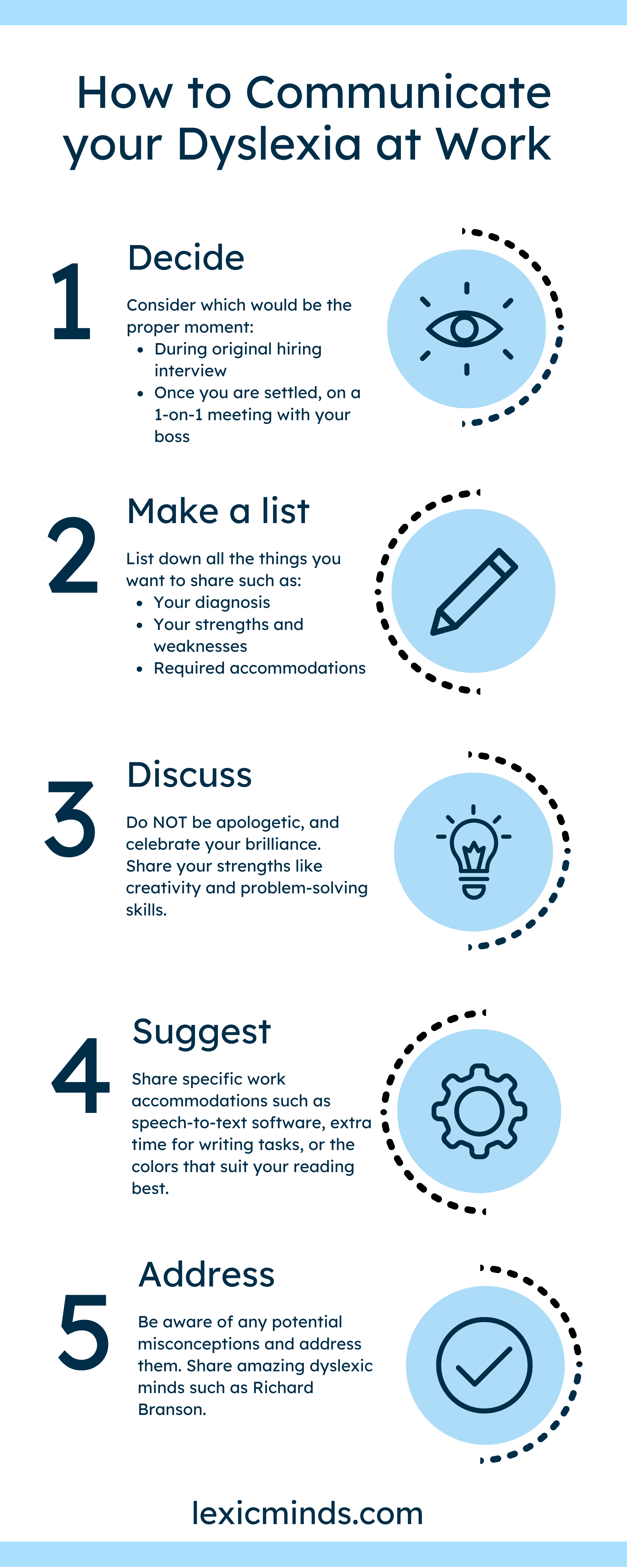Let us start with a quick level-set on Dyslexia.
What is Dyslexia?
Dyslexia is a different way the brain processes language and information. It is a unique neurocognitive attribute with strengths like innovative thinking, problem-solving, and excellent visual reasoning abilities. Rather than a disability, it is better to understand it as a distinct learning approach that implies both difficulties and incredible skills.
Reading fluency, spelling, and working memory for language-based tasks can be difficult; however, Dyslexia also implies a powerful mindset for spatial reasoning, big-picture thinking, and creative problem-solving. It is an increasingly valued asset in our modern workforce and society.
Is Dyslexia common in the workforce?
But note this: Dyslexia is way more common than most people realize. It affects between 10-15% of the population, which means there are likely dyslexic superstars working in just about every office and industry out there.
Now, the million-dollar question: Should I tell my boss I have Dyslexia? It is a dilemma that sparks all sorts of thoughts and feelings.
On the one hand, keeping it under wraps avoids potential discrimination or putting a perceived “limit” on your capabilities. But on the flip side, disclosing Dyslexia opens the door to accommodations that could seriously grow your job performance and satisfaction.
It is a personal decision with no clear right or wrong answer. We are here to lay out all the essential considerations for you to make the perfect call for your unique situation.

4 Reasons to Consider Disclosing Dyslexia to Your Employer
1. You will get legal protections and proper work accommodations
Okay, let us start with the practical side of things. In a lot of US states and countries, Dyslexia officially counts as a disability under the law. What does that mean for you? By disclosing it, you are open to executing your rights to all sorts of accommodations at work. Things like speech-to-text software, extra time to work your magic on projects, and even customized training to help you play to your strengths. It could push you to higher success.
2. You foster a culture of open dialogue
Keeping Dyslexia covered means operating in the shadows and potentially not exploiting all your talents. Letting your boss in on it allows for an open and honest dialogue. You can have real conversations about maximizing your unique skills and getting the support to absolutely excel at your role. Remember that it is a two-way street to building real understanding. How will your boss give you projects to exploit your problem-solving abilities if they do not know you have them?
3. You may alleviate stress and anxiety
Constantly trying to hide or “fake” something is one massive mental drain. Disclosing your Dyslexia at work means you can kick that exhausting burden and have the space to focus on what truly matters. There will be no more masking challenges or questioning your self-worth. You can finally release that weight and bring your authentic self to work.
4. You will boost your job performance
The last reason will also benefit your organization and that is something you can sell. With some customized tools and workarounds, sharing about your Dyslexia could legitimately take your job performance to new heights.
Why?
Once you are set up with the proper accommodations and support system, those incredible dyslexic strengths like innovative thinking and problem-solving will shine. No more spending extra time double-checking the spelling. It is about your time and your potential.
As our goal is to help you collect all the perspectives, it is only fair that we also walk around the potential downsides and how to handle them.
4 Reasons for Not Disclosing Dyslexia to Your Employer
1. You may have concerns about discrimination or stigma
It may be complicated to sugarcoat the stigma that may still exist in some organizations. This creates some valid worries when deciding whether to openly discuss your Dyslexia with your superiors. Even though it can have legal repercussions in some US states and countries, discrimination in hiring and promotions based on Dyslexia can definitely still exist. You might encounter obsolete assumptions that Dyslexia means you are less capable.
How to manage: Remember that this may only be a lack of information. If you receive a discouraging reaction, encourage your team to browse resources or get training. Here is the bright side: those stereotypes are fading, and the awesome strengths of dyslexic employees are gaining mass recognition.
2. You may feel that you are getting career restraining
You might be thinking “But what if disclosing Dyslexia hurts my chances for big opportunities down the road?” It is an understandable fear, but one that can be overcome. By confidently showcasing your innovative problem-solving skills and incredible work ethic, you will be unstoppable.
How to manage: If in the end, it does not work correctly and you notice your career restrained, consider changing jobs to a more dyslexic-friendly corporation. Many enterprises are well-known even for giving preference to dyslexic workers when they hire, for instance, Virgin. Actually, the enterprise drove a 1,562% increase in positivity about Dyslexia.
The right employers will value your unique talents.
3. You may have a preference for privacy
Maybe you are a fiercely private person who would rather not disclose personal info to your employer. That is a valid reason. Choosing what to share and what to keep private is your call.
How to manage: There are ways to maintain boundaries while still advocating for accommodations. Remember that these may help you increase your work productivity and give you both career and financial opportunities.
4. You feel like you can manage without work accommodations
For some dyslexic workers out there, Dyslexia might feel manageable on their own. You may have coping strategies ready to use, so disclosing and jumping through accommodation may not seem worth the journey. If that is you, keeping it to yourself is also a valid choice. If it does not sound like you, that is completely fine as well.
How to manage: Remember that Dyslexia and work accommodations are not a one-size-fits-all. Consider that would make you feel more comfortable to thrive.
The key is tuning into your gut instincts. Do not let fear cloud your judgment: you got this!
How to Tell My Boss I Have Dyslexia?
So, you have decided to have an open conversation with your boss. Amazing! Here is a guide on how to get started.
Step #1 Decide the proper moment on where and when to disclose it
The timing of your truth is up to you. Some people prefer getting it out in the open right during hiring interviews. This may give you a perspective on how the team of the company manages their employees when they need dyslexic accommodations.
Others like to establish themselves first before disclosing and after being hired. We understand that some people may not have a freer choice to risk their hiring as well.
There is no universally right approach: just go with what feels most authentic and comfortable for you. Book a 1-on-1 with your boss when you are ready.
Step #2 Make a list of the things you would like to share
You can add keywords that remind you of all the points to cover. For example:
- Your diagnosis
- Strengths in Dyslexia
- Difficulties at your work
- Any required accommodation
- Resources you can share
Crafting a list will also help you sound confident and outshine your people skills.
Step #3 Frame the conversation around inclusivity
It may be a proper opportunity to shape the narrative and educate. Do NOT lead with apologies or make it sound like a struggle. Celebrate your dyslexic strengths like crazy creativity and killer problem-solving skills. Explain to your boss how disclosing your Dyslexia will allow you to operate at your brilliant best with some accommodations.
Step #4 Suggest the accommodations that would help you
Come prepared with some specific accommodation ideas that could help your work. Things like speech-to-text software, extra time for writing tasks, or having instructions printed on yellow paper. But also collaborate by asking your boss for suggestions. They may have stellar ideas to support your talents.
Some companies have trained their employees to assist their dyslexic employees. If yours have not, suggest this great LinkedIn course by Made By Dyslexia.
Step #5 If necessary, address any misconceptions around Dyslexia
Your boss might have some outdated Dyslexia stereotypes. Neutralize those by providing straightforward myth-busting facts. Emphasize that Dyslexia is increasingly understood as a valuable cognitive trait, not a deficit. And of course, remind them of the brilliant minds who are dyslexic such as Richard Branson, Keira Knightley, and Steven Spielberg #lexicminds.
The goal? Leave that conversation with your boss feeling enthusiastic about your dyslexic strengths and excited to explore accommodations together.
Let’s go!
Points of Action
- Reflect on your personal priorities and workplace needs to determine if disclosing your Dyslexia aligns with your goals
- Prepare your talking points that highlight your strengths and suggest specific accommodations to discuss with your employer
- Reach out to Dyslexia advocacy groups or mentors for guidance on navigating this process with confidence
- Check out other articles by Lexic Minds and our Product Recommendations to suggest during your 1-on-1 with your boss
Key Takeaways
- Disclosing Dyslexia is a personal choice with no objective right or wrong answer. Listen to your instincts about what is best for your circumstances.
- Own your brilliant dyslexic strengths like big-picture thinking, creativity, and problem-solving prowess, and do NOT be apologetic.
- Open communication, accessing accommodations, and being your authentic self at work will improve your job satisfaction and performance.
- The right employer will recognize and appreciate your amazing talents.
The most important thing? Feeling empowered to make whichever decision allows you to truly thrive as your best self in your career. We are rooting for you.
Sources:
What is dyslexia? – Understood
54 Dyslexia Statistics & Facts
Understanding the Law – Yale Dyslexia
How Virgin drove a 1,562% increase in positivity about Dyslexia
Empowering Dyslexia Thinking at Work – LinkedIn
Disclaimer: This is not medical advice. Please consult with a licensed professional when in doubt. Lexicminds is not liable for actions taken from this page.









